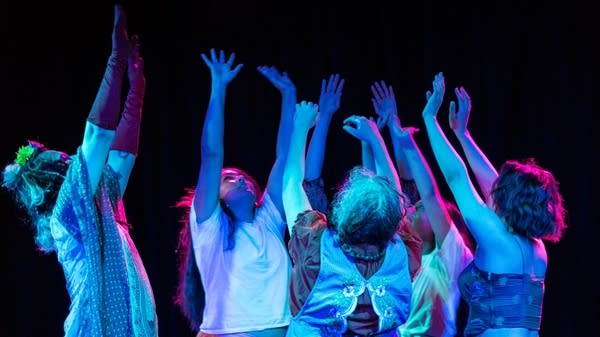Mpls. theater — home to nonbinary artists — to close after 15 years
Rather than go into debt, 20% Theatre will use its last season to celebrate its accomplishments

Go Deeper.
Create an account or log in to save stories.
Like this?
Thanks for liking this story! We have added it to a list of your favorite stories.
Updated: August 20, 12:23 p.m.
Claire Avitabile, 20% Theatre’s founder and executive director, has been thinking a lot lately about endings. The company announced Wednesday that the next season, led by Artistic Director Marcela Michelle, will be its last.
Avitabile said often society views such an outcome as tragic. “But endings can be OK,” she said. “They can be happy, they can be the right thing.”
The company realized last November that, given the current funding climate, it would not be able to sustain itself beyond the coming year. State and private grant priorities were shifting, Avitabile said, and a few key donors were no longer in a position to give. Rather than go into debt, 20% Theatre will use its last season to celebrate accomplishments.
Turn Up Your Support
MPR News helps you turn down the noise and build shared understanding. Turn up your support for this public resource and keep trusted journalism accessible to all.
“I feel like I would be much more devastated had our community not started to include women and queer and trans folks so much more in the arts,” said Avitabile. “But we have and even the country has.”
Avitabile, who identifies as queer, moved to Minnesota in 2005 after learning about the Twin Cities’ vibrant theater scene. But once she settled in, she noticed it was extremely difficult for new performers to break into the scene, especially if they were queer or transgender.
“Dykes Do Drag had been around already for a while — they're an outstanding cabaret,” Avitabile said. “And there was plenty of drag and queer performance pop-up things, but there wasn't theater.”

Avitabile created 20% Theatre Company to provide more opportunities for women and nonbinary performers to work in theater. The name comes from a 2002 statistic that only 20 percent of professional theater artists were women.
Three years after opening, the company staged "The Naked I: Monologues from Beyond the Binary.” People traveled from across the Midwest to see their stories represented on stage, and immediately demanded more. 20% Theatre has created four new “Naked I” productions since then, and published all of them.
Performer and teaching artist Catherine Charles Hammond remembers seeing “The Naked I” in 2011, when they were in college. They say it was a complete revelation.
“To see so many different writers and performers, voices and perspectives was really, really transformative,” said Hammond. “I remember somebody in the audience that night saying, ‘This is the first time I've been in a room with other trans people.’”
Hammond went on to perform in subsequent “Naked I” shows. In more recent years, they’ve had opportunities to work with other theater companies in the Twin Cities. Hammond served as the dramaturge for “Superman Becomes Lois Lane” a show at the History Theatre in St. Paul; the show was written by, directed by and starred transgender people.
“I think that that's due in large part to 20% [Theatre] fostering this community of artists and really nurturing this community of local artists,” said Hammond.
Hammond said they are both sad that 20% Theatre is closing and grateful for all it’s done to transform the Twin Cities theater scene.

Artistic Director Marcela Michelle says the announcement of the theater’s closure should be seen as a call to action. She points to other theater spaces that have closed in recent years —Patrick’s Cabaret, Intermedia Arts, and Madame of the Arts — that served as homes for queer and transgender performers.
“What we need moving forward is a commitment from local, state, and national funders, as well as continued patronage and support from our direct community of allies,” said Michelle. “We need our city and state to triple down on our work, we need to be recognized as artists inherently, and not added to programming at the last minute when companies realize they need to tick off a box. We need to be in positions of leadership, we need opportunities as directors and producers, artistic directors and educators, not just as performers.”
Michelle says she plans to continue producing one of 20% Theatre’s core programs, “Q-Stage,” a new works series, after the company closes.
Transgender, nonbinary artists need a place they can call homeAvitabile agrees there’s much more work to do, and that she is grieving the pending closure of 20% Theatre Company. But she also feels the company has a lot to be proud of.
“We have worked with hundreds of outstanding artists, some of whom got their start with us and have gone on to become McKnight fellows or develop original work across the country,” said Avitabile. “That's beautiful to me. That fills up my heart and reaffirms why I started any of this in the first place. I just wanted to make opportunities happen. Because I knew if they did only good would come of it.”
Avitabile said she’s excited to witness a new generation of artists rising up, particularly transgender artists who are now working on creating their own organizations.


